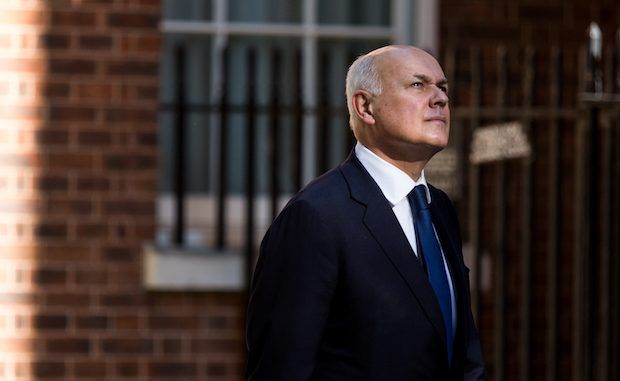
Iain Duncan Smith, the work and pensions secretary has said he is stepping down from his post because of pressure to make cuts to disability benefits.
Sounding almost like he cared, IDS said the cuts were a “compromise too far” in a Budget that “benefits higher earning taxpayers”
Labour leader Jeremy Corbyn said: “The resignation of Iain Duncan Smith reveals a government in disarray and a chancellor who has lost the credibility to manage the economy in the interests of the majority of our people.

BYPASS THE CENSORS
Sign up to get unfiltered news delivered straight to your inbox.
You can unsubscribe any time. By subscribing you agree to our Terms of Use
“The Budget has exposed George Osborne’s record of profound unfairness and economic failure. Not only must the cuts to support for disabled people be abandoned, but the government must change economic course.
“The chancellor has failed the British people. He should follow the honourable course taken by Iain Duncan Smith and resign.”
Here is Iain Duncan Smith resignation letter to David Cameron in full:
“I am incredibly proud of the welfare reforms that the Government has delivered over the last five years. Those reforms have helped to generate record rates of employment and in particular a substantial reduction in workless households.
As you know, the advancement of social justice was my driving reason for becoming part of your ministerial team and I continue to be grateful to you for giving me the opportunity to serve. You have appointed good colleagues to my department who I have enjoyed working with. It has been a particular privilege to work with with excellent civil servants and the outstanding Lord Freud and other ministers including my present team, throughout all of my time at the Department of Work and Pensions.
I truly believe that we have made changes that will greatly improve the life chances of the most disadvantaged people in this country and increase their opportunities to thrive. A nation’s commitment to the least advantaged should include the provision of a generous safety-net but it should also include incentive structures and practical assistance programmes to help them live independently of the state. Together, we’ve made enormous strides towards building a system of social security that gets the balance right between state-help and self-help.
Throughout these years, because of the perilous public finances we inherited from the last Labour administration, difficult cuts have been necessary. I have found some of these cuts easier to justify than others but aware of the economic situation and determined to be a team player I have accepted their necessity.
You are aware that I believe the cuts would have been even fairer to younger families and people of working age if we had been willing to reduce some of the benefits given to better-off pensioners but I have attempted to work within the constraints that you and the Chancellor set.
I have for some time and rather reluctantly come to believe that the latest changes to benefits to the disabled and the context in which they’ve been made are, a compromise too far. While they are defensible in narrow terms, given the continuing deficit, they are not defensible in the way they were placed within a Budget that benefits higher earning taxpayers. They should have instead been part of a wider process to engage others in finding the best way to better focus resources on those most in need.
I am unable to watch passively whilst certain policies are enacted in order to meet the fiscal self-imposed restraints that I believe are more and more perceived as distinctly political rather than in the national economic interest. Too often my team and I have been pressured in the immediate run up to a budget or fiscal event to deliver yet more reductions to the working age benefit bill. There has been too much emphasis on money saving exercises and not enough awareness from the Treasury, in particular, that the government’s vision of a new welfare-to-work system could not be repeatedly salami-sliced.
It is therefore with enormous regret that I have decided to resign. You should be very proud of what this government has done on deficit reduction, corporate competitiveness, education reforms and devolution of power. I hope as the government goes forward you can look again, however, at the balance of the cuts you have insisted upon and wonder if enough has been done to ensure “we are all in this together”.


